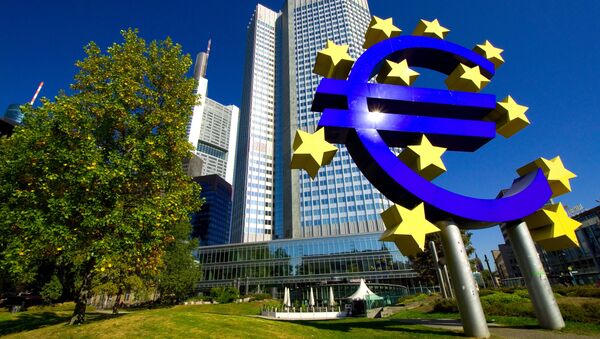WASHINGTON, August 1 (RIA Novosti), Lyudmila Chernova – The new and extended sanctions announced this week by Washington and Brussels will hurt everybody, and the impacts on the banking sector may be the most damaging, Andrew McKillop, a former chief policy analyst at the European Commission Directorate General for Energy told RIA Novosti.
"The risk for banking sector from increasing sanctions is very, very high, and with no exaggeration, a European bank sector crisis is now possible," McKillop said, noting that European banks are in a very bad situation already.
"This concerns bank loans to Russia and investment in Russia by EU companies using bank loans," McKillop said.
Earlier this week, the European Union sanctioned five Russian banks. On Thursday, Sberbank, VTB, Gazprombank, Vnesheconombank and Rosselkhozbank were barred from raising funds on European Union capital markets. The decision was made only two days after the European Union announced additional sanctions over the Ukrainian crisis.
The United States imposed new economic sanctions against Russia on July 29, targeting three major banks — VTB Group, Bank of Moscow and Rosselkhozbank.
"The penalties continue to be heavily political-type sanctions, but with increasing economic-type sanctions also, which can only harm and reduce global economic activity," McKillop underlined.
The policy analyst believes that the role of Germany and German economic sanctions is the most important, noting Washington is heavily pressurizing Merkel to increase German sanctions against Russia.
"Some EU countries, like the UK, have already admitted that the new sanctions will cause economic costs and problems for their own countries. Most-exposed countries apart from Germany, we can note are Italy and France and concern their bank-sector and their bank loans to Russia," McKillop said.
"This is what Americans call Lose-Lose, or the opposite of Win-Win," he added.
McKillop emphasized that although the increasing sanctions are designed to be deliberately provocative, they will not cause major change on the Russian side.
"Conversely I think that especially Washington will look for signs, or fabricate them using ‘false flags,’ that Russia is now more aggressive. When Washington does not find these signs like increased fighting in Ukraine, it will resort to more flagrant provocation," he explained.
"The sanctions will leave Putin with no choice but to continue his present political strategy of refusing to be provoked or goaded into a Red Army invasion of east Ukraine," he concluded.
Earlier this month, the US Treasury introduced a so-called Sectoral Sanctions Identification List that affects companies and institutions in defense, energy and banking sectors of the Russian economy.
The European Commission published Wednesday the names of eight individuals and three additional Russian entities targeted by sanctions over their alleged roles in the escalation of the Ukrainian crisis.
The new addition brings the number of persons and entities under EU restrictions to 95 persons and 23 entities.
The first round of sanctions against Russia was implemented by the United States and the European Union back in March as a response to Crimea’s reunification with Russia following a referendum.
Moscow has repeatedly said that these measures are counterproductive and called the sanctions a "road to nowhere."



